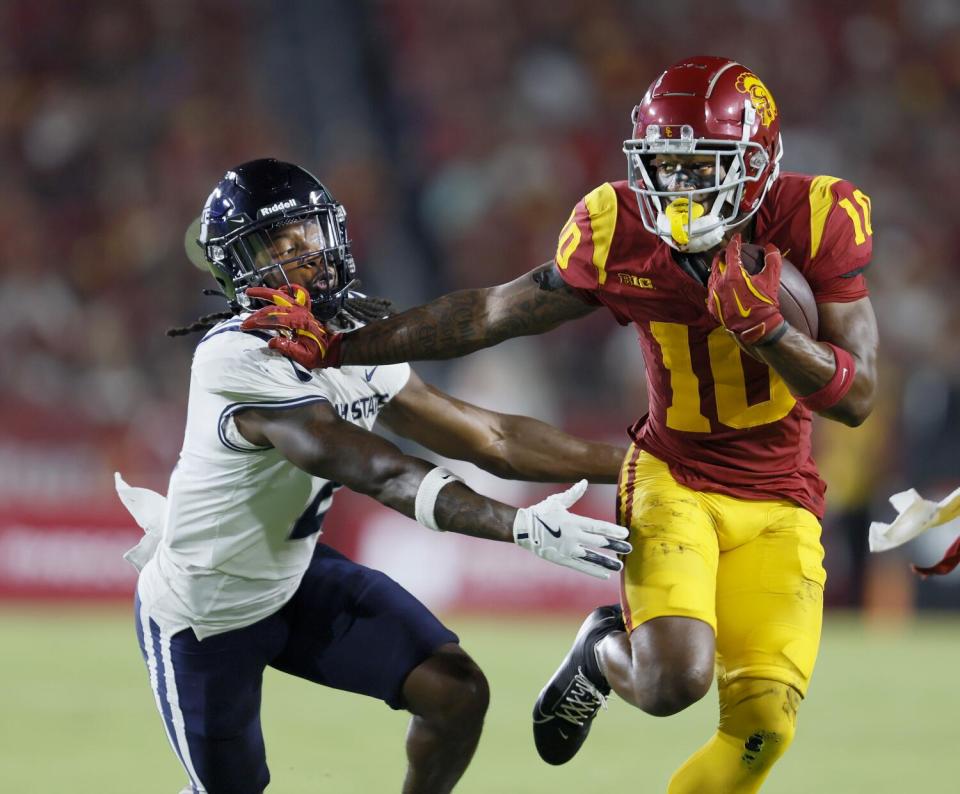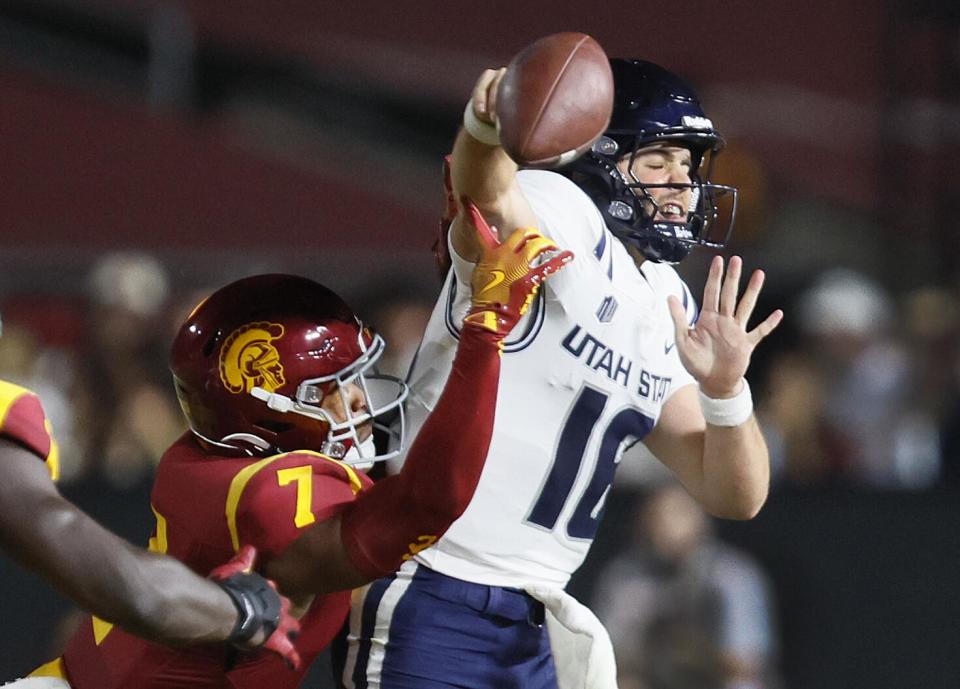USC dominates Utah State, stokes playoff talk and believes it can still get better

It seemed, at first, like a strange fit. A West Coast power, known for its flash, paired with a conference known for its bulk and corn-fed brawn. Two years of patronizing questions about toughness and physicality from the rest of the Big Ten Conference had suggested as much about USC, which hadn’t offered much reason to believe they belonged in such a weight class, where the notion of three yards and a cloud of dust was sacrosanct.
But never had the doubt in USC felt so misplaced as it did Saturday, with the Trojans rolling in the run game and the defense dominant in every sense of the word. As the mightiest of the Big Ten were beaten up Saturday, USC emerged from the rubble looking the part of a conference heavyweight. In its final dress rehearsal before its Big Ten slate begins, USC managed to bully its way to the forefront of the College Football Playoff conversation with a 48-0 beatdown of Utah State, its first shutout since November 2011.

For the second week in a row, the Trojans’ stunning transformation on defense under new coordinator D’Anton Lynn was on full display. USC held Utah State to just 190 yards, its fewest allowed since 2014. It gave up just two third-down conversions. And only once did USC’s defense allow Utah State to pass the 40-yard line into Trojan territory.
“To see that group really come together and play as one early here in the year was very important,” USC coach Lincoln Riley said. “We’re excited about it. There’s just a long ways to go, man.”
But the distance the Trojans' defense has already traveled was especially clear Saturday in its trampling of Utah State quarterback Bryson Barnes. A year ago, in this same building, Barnes took the reins of the Utah offense as a backup, scored four touchdowns and led Utah on a last-minute drive to beat USC. The loss sent the Trojans spiraling, as they lost three of their final four to end the regular season.
Read more: Reggie Bush and Caleb Williams have their jersey numbers retired by USC
This time, however, Barnes could barely move the ball. He threw for just 103 yards and finished with -eight yards on the ground, as USC’s defense refused to allow him an inch where it might have given up a mile last season.
“It was all about keeping him bottled in, keeping constant pressure, but also maintaining disciplined rush lanes,” USC defensive end Jamil Muhammad said.
The Trojans managed to do just that without the help of one of their leading linebackers, Mason Cobb, who sat out the game with an injury. In his place, linebacker Eric Gentry delivered a standout performance, leading USC with seven tackles and a sack.
He was hardly the only one. Easton Mascarenas-Arnold had seven tackles of his own to go with an interception, while Kamari Ramsey, another new addition to USC’s defense, had a sack and a forced fumble from his safety spot. By the fourth quarter, with the game well in hand, the Trojans brought in a host of backups. And still, they managed to uphold the shutout, allowing just 89 yards in the second half.
It was just the sort of defensive showcase that USC could only have dreamed of in the offseason — and precisely how it will have to play if USC hopes to contend in its first season in the Big Ten.

By Saturday night, at least, that path to contention, both in the conference and College Football Playoff, cleared up considerably.
Michigan, the defending champs and USC’s next opponent, was run out of the Big House by Texas, as it struggled to move the ball with a new quarterback. Notre Dame lost on a game-winning kick to Northern Illinois, a team it paid $1.4 million to play in South Bend, Ind. Penn State needed a late comeback to overcome its defensive woes and beat Bowling Green, while Oregon barely slipped past Boise State.
All week long, Riley had counseled his team to not overlook the Aggies.
Instead, the Trojans trampled over them.
USC also made a point all week to establish the run, after finding little running room against Louisiana State. And from the first drive Saturday, USC had little issue exerting its will. Woody Marks rolled for 49 yards on his first three carries, while Quinten Joyner's first three went for 53. Led by that pair of backs, who ultimately combined to average more than eight yards per carry, USC piled up 249 yards and five touchdowns on the ground.
It didn’t hurt that both had massive holes to run through, thanks to a strong performance from USC's offensive line.
“We only need a little bit of a hole, and they gave it to us all night,” said Marks, who finished with 103 yards and a touchdown on just 13 carries. Joyner finished with 84 yards and two touchdowns.
The rushing attack was so dominant that quarterback Miller Moss didn’t need to do much for USC to roll. Moss still threw for 229 yards and a touchdown in an efficient performance before he was replaced by his backup late in the third quarter.
By that point, the win was well in hand. All that was left was to hold onto the shutout. A power outage in the Coliseum knocked out a swath of stadium lights in the fourth quarter, and the question of whether the game should even be finished was broached.
Read more: Why USC sold Coliseum field space to DirecTV: It's 'an adapt-or-die scenario'
The lights were eventually fixed. The defense, by then populated by mostly freshmen and backups, continued to stand tall. A last-ditch field goal attempt from Utah State, which would’ve ended the shutout, came up well short.
It made for a bold statement, with USC now on the doorstep of its Big Ten season. But after USC's most dominant performance in years, the prevailing feeling Saturday was this brand of beatdown is just beginning to take hold.
“We’re still not even close to as good as we can be,” Mascarenas-Arnold said.
This story originally appeared in Los Angeles Times.

